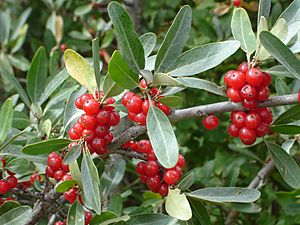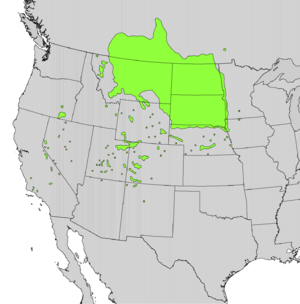Silver buffaloberry facts for kids
Quick facts for kids Silver buffaloberry |
|
|---|---|
 |
|
| Scientific classification | |
| Genus: |
Shepherdia
|
| Species: |
argentea
|
 |
|
| Synonyms | |
|
|
The silver buffaloberry (scientific name: Shepherdia argentea) is a cool shrub found in North America. People also call it the bull berry or thorny buffaloberry. It belongs to the Russian olive family.
This plant grows naturally across central and western North America. You can find it from the Prairie Provinces in Canada (like Alberta, Saskatchewan, and Manitoba). It also grows south into the United States, reaching as far as Ventura County in California. You can also spot it in northern Arizona and northwestern New Mexico.
Contents
What the Silver Buffaloberry Looks Like
The silver buffaloberry is a deciduous shrub. This means it loses its leaves every fall. It can grow to be about 2 to 6 meters (6 to 20 feet) tall.
Leaves, Flowers, and Fruit
Its leaves usually grow in pairs opposite each other. They are about 2 to 6 centimeters long. The leaves are oval-shaped with a rounded tip. They look green but are covered in fine, silvery, silky hairs. The underside of the leaves is even more silvery than the top.
The flowers of the silver buffaloberry are pale yellow. They have four sepals, which are like small leaf-like parts that protect the flower. But they do not have any petals.
The fruit is a bright red, juicy berry. It is about 5 millimeters wide. You can eat these berries, but they taste a bit bitter. There are also special types, 'Xanthocarpa' and 'Goldeneye', that grow yellow fruit instead of red.
How Silver Buffaloberry Helps Nature
The silver buffaloberry is very important for many animals. Its berries are a main food source for the sharp-tailed grouse. This bird is even the official bird of Saskatchewan.
Shelter and Food for Animals
The leaves of the shrub provide important food for mule deer and white-tailed deer. The plant has thorny branches and grows in thick groups. This makes it a great hiding spot for many small animals. It is also a perfect place for songbirds to build their nests.
Across the areas where it grows, the buffaloberry is a key plant in many natural places. For example, in the grassy areas of North Dakota, it grows with many native grasses. In the woodlands near rivers in Montana and western North Dakota, it grows with trees like green ash.
How People Use Silver Buffaloberry
Just like the Canada buffaloberry, the silver buffaloberry has been used by people for a long time. It was used as food, medicine, and even as a dye.
Traditional Uses
Historically, people used it to help with stomach problems. It was also used in special ceremonies for girls as they grew older.
In the Great Basin area, Native Americans ate the berries fresh. They also dried them to save for winter. Often, they cooked the berries into a tasty sauce for bison meat. The buffaloberry was a very important food for some American Indian groups. They ate the berries in puddings, jellies, and as fresh or dried snacks. The Gosiute Shoshone people call this plant añ-ka-mo-do-nûp.

